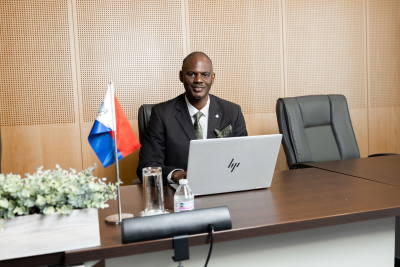 PHILIPSBURG:--- The Trust Fund’s Enterprise Support Project (ESP) is moving into a new chapter focused on supporting the growth and sustainability of local businesses. On Tuesday, February 10, at the National Recovery Program Bureau offices in Philipsburg, the final Micro, Small, and Medium-sized enterprise (MSME) approved for financing under ESP participated in a ceremonial signing. This brings them into the cohort of 323 businesses, strengthened through project support during Sint Maarten’s post-Irma recovery period. With this signing, ESP formally concludes its financing activity and now turns its focus towards delivering targeted programs centered on accelerating growth, sustainability, and long-term business success for the island’s MSMEs.
PHILIPSBURG:--- The Trust Fund’s Enterprise Support Project (ESP) is moving into a new chapter focused on supporting the growth and sustainability of local businesses. On Tuesday, February 10, at the National Recovery Program Bureau offices in Philipsburg, the final Micro, Small, and Medium-sized enterprise (MSME) approved for financing under ESP participated in a ceremonial signing. This brings them into the cohort of 323 businesses, strengthened through project support during Sint Maarten’s post-Irma recovery period. With this signing, ESP formally concludes its financing activity and now turns its focus towards delivering targeted programs centered on accelerating growth, sustainability, and long-term business success for the island’s MSMEs.
The signing ceremony was attended by the Honorable Minister of TEATT, Grisha Heyliger-Marten, and NRPB Director Claret Connor. Speaking at the ceremony, the Minister of TEATT congratulated the final beneficiary, Yumi Lake from Alie Construction and Design.
“At TEATT, we always say small businesses are the backbone of Sint Maarten’s economy. And to hear about another local construction company benefiting from the Enterprise Support Project is a plus for us. Congratulations to the ESP for implementing this wonderful program. We are looking forward to continued work with ESP on creating an environment where MSMEs can continue to grow and shine.”
The Enterprise Support Project was established to assist local businesses affected by Hurricane Irma in reopening, stabilizing, and moving forward. Through access to loans and grants, businesses were able to make practical investments in their operations and future viability. For some, this included purchasing new equipment and technology, while others focused on reconstructing premises or replenishing damaged inventory, strengthening their ability to operate sustainably in the post-Irma economic environment. Nearly half of all supported businesses were run or owned by women, and more than 350 entrepreneurs participated in ESP-funded training, coaching, mentoring, and development programs.
ESP is implemented by the NRPB on behalf of the Government of Sint Maarten. It is funded by the Sint Maarten Trust Fund, financed by the Government of the Netherlands, and managed by the World Bank.
 PHILIPSBURG:--- The Minister of Public Health, Social Development and Labor (VSA), Mr. Richinel Brug, has formally requested the advice of the Social Economic Council (SER) regarding the potential introduction of a supplementary pension system for Sint Maarten.
PHILIPSBURG:--- The Minister of Public Health, Social Development and Labor (VSA), Mr. Richinel Brug, has formally requested the advice of the Social Economic Council (SER) regarding the potential introduction of a supplementary pension system for Sint Maarten. PHILIPSBURG:--- The Minister of Finance, Hon. Marinka J. Gumbs, recently paid a courtesy visit to the new office of the Algemene Pensioenfonds Sint Maarten (APS), located in Diamond Estate, Cole Bay, where she was welcomed by APS Director Mr. Oscar Williams and members of the APS team.
PHILIPSBURG:--- The Minister of Finance, Hon. Marinka J. Gumbs, recently paid a courtesy visit to the new office of the Algemene Pensioenfonds Sint Maarten (APS), located in Diamond Estate, Cole Bay, where she was welcomed by APS Director Mr. Oscar Williams and members of the APS team. PHILIPSBURG:--- The Sint Maarten Tax Administration is pleased to announce that seniors aged 62 and older will receive priority service during the 2026 Motor Vehicle Sticker distribution at the Receiver's Office on Pond Island.
PHILIPSBURG:--- The Sint Maarten Tax Administration is pleased to announce that seniors aged 62 and older will receive priority service during the 2026 Motor Vehicle Sticker distribution at the Receiver's Office on Pond Island.